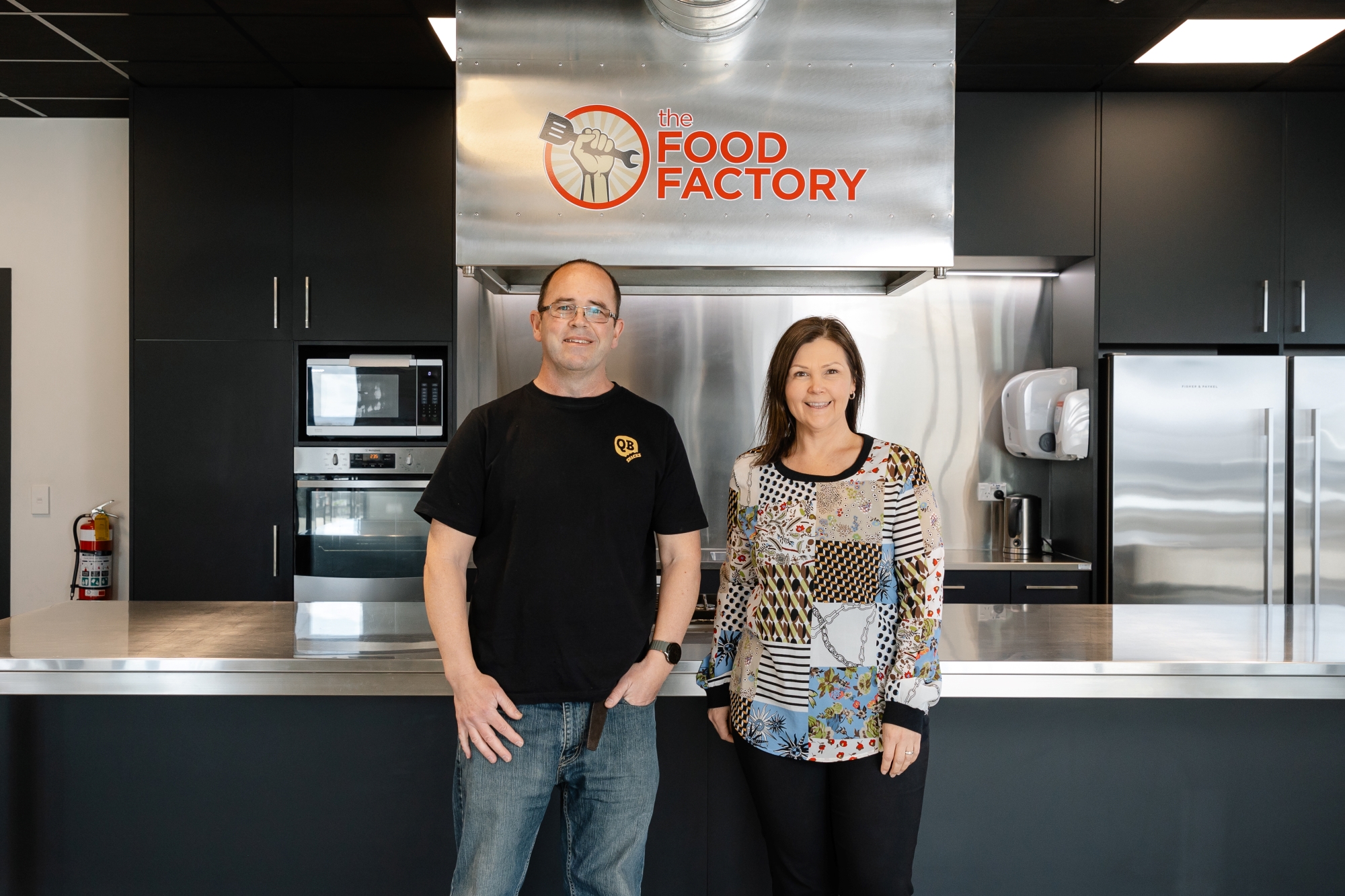Food Factory fuels local innovation


Food Factory manager Olivia Martyn (right) with Graham Manson from QB Snacks who has been operating out of The Food Factory for the last two and a half years. Photo: Tessa Claus
It has been four years since a building in the backstreets of Stoke was turned into an incubator for aspirational local food businesses. Charles Anderson catches up with The Food Factory to see how its vision is materialising.
The cheese is being cut in the first kitchen. The muesli is being mixed in the second. These are some of the businesses that have made their home at The Food Factory, an idea that was years in the making before it finally opened in 2020.
That was a long road, from the kernel of an idea years earlier to finally getting some much-needed funding in 2019. But it was a dream of the site’s neighbour, Pic’s Peanut Butter, whose founder, Pic Picot, always hoped to help other aspiring food businesses on their journey to success. “Lots of people—you know, have got their mother's famous sauce recipe that they always knew they could make a fortune out of but they've never really had the opportunity to give it a go,” Pic said when the government funding came through.

The inspiration for this project came from Pic’s visit, many years before, to a collaborative workshop where he experienced firsthand the benefits of working in a shared creative space. This sparked his vision to create a similar space specifically tailored for the food industry in Nelson. “It was his dream to have something like this, specifically for the food industry,” Food Factory general manager Olivia Martyn explains. "The idea was to create a space where food producers could come together, share ideas, collaborate, and grow their businesses without the need to invest in their own premises immediately."
The region is not short of food and beverage brands, but scaling up is a challenge, with limitations coming from running a home-based business. The factory includes four kitchens that can be hired for up to several months, with some tenants staying on for several years.
Under the guidance of Olivia, The Food Factory has quickly become an incubator for food business success, offering invaluable resources, expertise, and a collaborative environment to foster the growth of small food enterprises. The Food Factory was established as a charitable trust, focusing on helping food entrepreneurs upscale their operations from home kitchens or small setups to a more professional environment. It provides an intermediate step for businesses that have outgrown their initial spaces but are not yet ready to make the significant investment required to establish their own facilities.
The Food Factory offers a versatile space that caters to a wide range of food-related activities. One of the most prominent features of the facility is the demonstration kitchen, which is regularly used by various groups for different purposes. “This space is used by quite a few different groups,” Olivia says. “We have food cart entrepreneurs who come in to bake their goods before selling them from their food carts. We also host cooking classes, both one-off workshops and regular classes, such as those run by Age Concern for elderly people learning to cook for themselves.”

The demonstration kitchen is also used for school holiday programmes, food photography sessions, and even the creation of materials for teaching food technology at high schools. The space is highly adaptable and can be transformed into a dining room for special events, such as Indian cooking classes hosted by local food businesses. “This space is used in so many different ways, depending on what people need,” Olivia adds. “It's a hub of creativity and collaboration.”
The core mission of The Food Factory is to act as an incubator, providing businesses with the resources and support they need to grow and succeed. The facility is designed to be a stepping stone for food entrepreneurs, offering them the opportunity to upscale their operations without the financial burden of investing in their own premises. “For us, it’s really about helping people who are brave enough to start their own food businesses.”
“We want them to be able to afford to upscale their food business from doing it in their own home kitchen or garage,” Olivia explains. The collaborative environment at The Food Factory also plays a crucial role in the success of its tenants. By working alongside other food businesses, entrepreneurs can share experiences, navigate common challenges, and benefit from economies of scale when it comes to sourcing ingredients and packaging. “The complexities that food businesses face are common across the industry,” Olivia says. “Being in this space allows them to share those challenges and find solutions together.”

While The Food Factory provides a supportive environment for food businesses, it is not intended to be a permanent home for them. The goal is for businesses to use the space as a launchpad, staying for a time before moving on to their own premises. “The longest a business has stayed here is just over three years,” Olivia notes. “Typically, around the two-and-a-half to three-year mark, they are ready to move on.”
Some of the businesses that have passed through The Food Factory have gone on to achieve significant success. For example, Yum Granola, which started at The Food Factory, recently moved to its own premises after three years at the facility. Similarly, QB Snacks has been operating out of The Food Factory for two and a half years and is now ready to take the next step in its journey.
The trust does not own the building, which presents a significant financial challenge. Despite this, The Food Factory strives to keep rental costs as low as possible to make the space accessible to food entrepreneurs. The spaces can also be rented for $200+GST a day. “We're heavily reliant on sponsorship to keep the facility running,” Olivia says. “The Provincial Growth Fund provided $750,000 to help fit out the space, but our single biggest overhead is the building rent.”

One of the key benefits of The Food Factory is the wealth of knowledge and expertise available to its tenants. Olivia herself is a food technologist with two decades of experience in the industry, and she provides valuable guidance to food businesses navigating the complexities of regulatory compliance, packaging, and scaling up production. “We get people from all stages of business development,” Olivia explains. “Some have an idea but don't know how to start, while others are already successful at the local market level and need help scaling up. That's where we can really make a difference.”
The Food Factory also has a network of professionals who can provide additional support that ensures that food businesses have access to the resources they need to succeed. Launching a food business comes with its own set of unique challenges, many of which are not immediately apparent to new entrepreneurs. One of the biggest hurdles is regulatory compliance, particularly when it comes to ensuring that packaging meets food standards. "Regulatory compliance is always one of the biggest challenges," Olivia says. "Making sure your packaging is compliant with the Food Standards, creating a nutrition panel, and listing ingredients correctly are all critical."
Consistent procurement of ingredients is another challenge, as is navigating the complexities of the New Zealand supermarket landscape. The Food Factory provides the guidance and expertise needed to overcome these obstacles, helping food businesses launch successfully and grow sustainably. “Getting into and staying in supermarkets is no small feat,” Olivia notes. “It's a real challenge, but once you've cracked it, you're on your way.”
The Food Factory is a unique offering in Nelson, and Olivia anticipates that demand for the facility will continue to grow as more people look to start their own food businesses. “Generally speaking, we've always had one room free, so people have been able to shuffle,” she says. “But I anticipate there will be a waitlist in the future, based on the number of inquiries we're getting.”

The Food Factory allows food entrepreneurs to stay in Nelson and grow their businesses locally, rather than having to move to larger cities like Auckland or Wellington. This is particularly important for those who want to remain in the area and contribute to the local economy. "Pic wanted to see more successful food businesses in this region," Olivia explains. "Nelson is known for great food and is a great place to live. The Food Factory provides an opportunity for people to stay here and be successful."
As The Food Factory continues to support the growth of small food businesses in Nelson, its impact on the local community and the broader food industry is undeniable. The facility provides a much-needed space for food entrepreneurs to collaborate, innovate, and grow their businesses, all while staying rooted in their local community. "For us, it's really about helping people who are brave enough to start their own food businesses," Olivia says. "It's a big thing to do, and we're here to help them be as successful as possible."
With its unique offering, supportive environment, and the wealth of knowledge and expertise available, The Food Factory is poised to continue making a significant impact on the food industry in Nelson and beyond. As more entrepreneurs discover the benefits of this collaborative space, The Food Factory's role as a vital incubator for food business success will only grow stronger.
